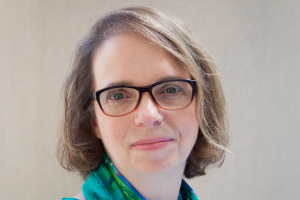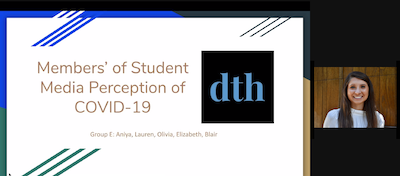Students in Hussman’s ‘Freedom of Expression’ course capture COVID-era UNC student oral histories

During a semester marked by the COVID-19 pandemic and UNC’s decision to go to all-virtual learning, a research project conducted by the “MEJO 448: Freedom of Expression” course at the UNC Hussman School of Journalism and Media ensures student voices will go down in history talking about the unprecedented time.
Associate Professor Tori Ekstrand developed the project in conjunction with UNC’s Southern Oral History Program (SOHP) not only to give her undergraduate students research experience, but to add student voices to the historical record of the time.
The students’ recorded interviews will live in the SOHP’s archives.
“The great thing about oral history is that it often fills in the bits of history that’s missing,” Ekstrand said, noting that written history often skews white, wealthy, male and older. “Part of what I wanted to do was elevate students’ voices.”
Students in the class virtually recorded interviews of other UNC students from different walks of campus life including student journalists, students who had contracted COVID-19, student athletes, students in Greek life, students who were part of a Facebook group called “Bagels Who Discuss” — a Triangle-based discussion group for young people who don’t identify as cisgender men — resident advisers and first-year students.
Students in the class chose the groups to reflect the different experiences of students during the pandemic, Ekstrand said. Roy H. Park Fellow and doctoral candidate Kriste Patrow, Ekstrand's teaching assistant, helped train the students in oral history methods for the project.
The students presented their findings to the class via a virtual session on Nov. 18, 2020, in which themes like mental health worries, changing social media habits and concerns about UNC’s handling of the pandemic surfaced in many of the groups’ findings.
Besides documenting UNC students’ experiences during the pandemic, Ekstrand also wanted the project to document how students were creating community with their peers and instructors, as well as how students found out about campus happenings and expressed themselves virtually during the pandemic.
“In other words, what did UNC’s free expression environment look like virtually during the pandemic?” Ekstrand said.
Ekstrand also wanted to give her students an opportunity to take part in an oral history research project, which she herself did as a doctoral student at UNC Hussman. “There’s something about this kind of research that sticks with you,” Ekstrand said.

The research project was definitely an experience that stuck with Blair Poirier `21, whose group interviewed members of student media. During the course, Poirier shared with Ekstrand, “I had my interview yesterday with an online editor at the Daily Tar Heel, who is an international student living at home in Pakistan and listening to her experience on COVID-19 and the student media was inspiring. As I've read through the transcript this morning, I can't help but think how the compilation of these orals is a such great opportunity to provide stories to future generations on the pandemic.”
Suzannah Claire Perry`23, whose group interviewed students from the Facebook group “Bagels Who Discuss,” appreciated the opportunity to speak with people one-on-one for the research, noting that the conversations added a detail and intimacy to gathering the information, especially for college students who — even before the pandemic — relied heavily on online interaction.
“It’s easy to live on the Internet, which is not always a good thing,” Perry said. “In a one-on-one conversation, you’re getting a lot of nuance and reflection that can’t be contained on social media.”
Emily Mayernik `21, whose group studied student athletes, agreed: “I don’t think that the answers would have been as personal if it hadn’t been a conversation,” said Mayernik.
Mayernik and other members noted the very specific experience of UNC’s student athletes during the pandemic, observing that they’d been allowed to stay on campus when other students weren’t and often had access to resources that other students didn’t.
However, many of the student athletes’ concerns mirrored those of students in other groups interviewed, such as maintaining good mental health during the pandemic, socializing safely and the uncertainty about the future of student life at UNC.
Specific themes that emerged within other groups included: students who had contracted COVID-19 were more concerned about transmitting the virus to their families than their own health; resident advisers, as paid university employees, felt especially worried about speaking out about UNC’s handling of the pandemic; and students in Greek life were concerned about Greek life’s reputation amid public criticisms that some of their members were not socializing responsibly.
However, Greek life member Ellie Baldwin '22, when interviewed by Grace Murtha '22, noted a silver lining — the pandemic-forced pause offered UNC Greek life members time to reflect and assess their organizations’ mission and focus.
“The pandemic offered a way to analyze our current situation … and who we are as an organization,” Baldwin said during her interview.
Baldwin also contracted COVID-19, from which she has since recovered, suffering from fever, fatigue and a loss of taste and smell during her bout with the disease.
“It was pretty scary … because I didn’t know what to expect,” said Baldwin of dealing with the disease’s symptoms. She also had friends contract COVID-19.
Rudi Colloredo-Mansfeld, the senior associate dean for social sciences and global programs in the College of Arts & Sciences, visited the class and noted the importance of the diversity of student voices captured in the project. “I like the diverse experiences that you sought to include — from athletes to resident advisers — that reveal the specific ways that the online university is being felt,” he told Ekstrand.
The project also led the students in the class to reflect on their own experiences during the pandemic. Perry, who was a first-year student when the pandemic first kept students off campus last spring, said students may not realize COVID’s full impact yet. “But I know I have more value for my relationships and just simple things like going to coffee shops with friends,” she said.